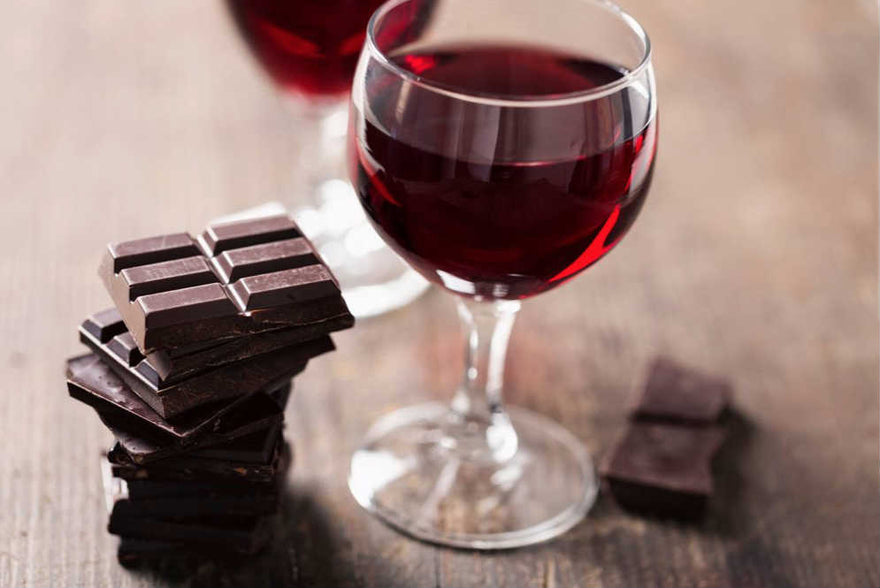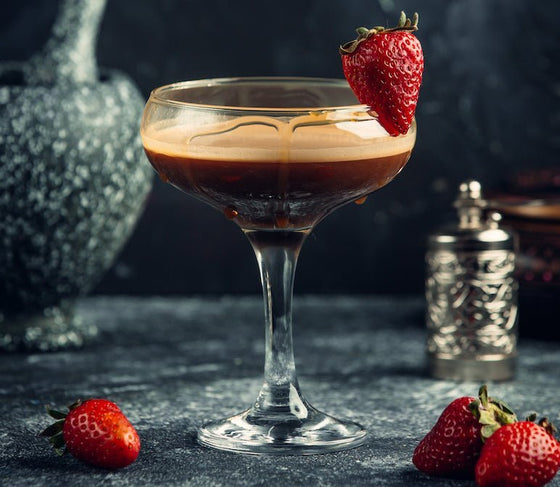

Chocolate and wine pairing can be tricky because both contain chemicals called polyphenols which taste very bitter, (mostly flavonoids in chocolate, mostly tannins in grapes), but on the plus side, both also have antioxidant, anti-inflammatory and other beneficial compounds.
The level of tannins (chemicals found in grape skins) affects the relative sweetness / dryness of wines, in the same way that levels of flavonoids contained in cocoa solids in chocolate create a more bitter / less sweet taste e.g. dark chocolate has 70% cocoa solids (bitter), milk chocolate 34% cocoa solids (sweeter).
So for a successful taste pairing you need to match the flavour strengths, otherwise the wine will overpower the chocolate or vice versa, making the wine taste more bitter, or the chocolate sickly sweet. Therefore, the drier / more bitter / more full bodied the wine, the stronger and more bitter tasting the chocolate needs to be (i.e. higher cocoa - dark as opposed to milk/white).
Choose a wine that’s slightly sweeter than the chocolate. Ice wines (made from grapes that have literally frozen on the vine thereby concentrating their sugars), late harvest Reislings, moscatos or sweet red blends that won’t clash, and fortified wines like Port, Sherry and Madeira are often a safe bet. If you want the bubbly, try a Champagne doux or Moscato d’Asti (a higher-end Asti spumante).
If you’re not really into sweet or white wines, pair lighter chocolate (white, milk and low cocoa dark e.g. 55%) with lighter-bodied red wines, and stronger chocolates with more full-bodied wines e.g. if serving milk chocolate or a chocolate truffle, try a light-bodied Pinot Noir. Pair dark chocolate or an intensely flavoured chocolate dessert with an Australian Shiraz or full bodied California Zinfandel.
Ideally when consuming or tasting wines, you want to go from light-bodied to full-bodied wines, and/or dry to sweet. When enjoying chocolate, you should go from light to dark i.e. white to milk to dark - the bitter flavonoids increase as the cocoa content increases, so the darker chocolates will ruin your palate for the lighter chocolate. If your chocolates are flavoured or filled, go by the chocolate coating (i.e. you have a selection of dark chocolate truffles and milk chocolate caramels, start with the caramels because of the 'milk chocolate' coating).
Muscat, white dessert wines (Ice wines, late-harvest sweeter Rieslings), Moscato d'Asti, a slightly sweet rose e.g. White Zinfandel - fruity with the aroma of strawberries work wonderfully with our ‘Very Berry’ range, as do fortified wines like cream sherry.
The difference between wines and 'Fortified wines' is that 'wines' only contain the alcohol that has resulted from fermentation. Fortified wines like Port, Sherry, Madeira and Marsala have had extra alcohol added to them, often in the form of a flavourless grape brandy, resulting in more of a liquer than a wine.
Also, surprisingly (for chocolate and wine matching disbelievers) a Pinot Noir pairs quite well with white chocolate (again in particular a white chocolate with strawberries) as it delivers the sweet flavours of red cherries, strawberries, and raspberries also found in the Pinot Noir.


Milk chocolate is by far the more versatile chocolate option for pairing with wine, again try the lighter, fresher red wines like a Pinot noir or a young Beaujolais (not as tannic as some more medium bodied reds), a fruity Syrah, or sweeter fortified wines like Port or Madeira.


Zinfandel, syrah/shiraz, Ruby port, Sherry, Cabernet Sauvignon – ideal choices for our ‘Purist’ range.


Below are a few of the classic chocolate flavour combinations, so if serving a chocolate based dessert rather than flavoured chocolate, simply choose whatever combination most closely resembles the dessert being served.
Salt increases flavours, so opt for either end of the wine spectrum e.g. sweet Late Harvest Gewürztraminer, or a Zinfandel.


Madeira, tawny Port, PX or Oloroso Sherry.
A full bodied Malbec - delightful with our decadently dark ‘Midnight Ginger’ - 80% dark chocolate topped with fiery chunks of crystalised ginger.


Banyuls, sparkling wines, Brachetto d'Acqui, Moscato d'Asti, Ruby Port - perfect accompaniments for our ‘Fruit & Nut Clusters’.
Madeira, Tawny Port, PX Sherry, Vin Santo, Muscat de Beaumes-de-Venise, sweet sparkling wines
Cabernet Sauvignon, Cab Franc, Shiraz, Moscato d'Asti, or some sweet dessert-style red wines - just the ticket to savour our ‘Mint Chocolate Crackle’.
Madeira - this delicious dessert wine has lovely citrus notes which complement chocolate / orange perfectly - ideal with our succulent 'Dipped Oranges'.


Madeira, Port, PX Sherry, Vin Santo, Shiraz


Also consider the other ingredients on the plate – if you’re dipping strawberries or garnishing with berries, find wines that match these flavour profiles.
Palate preferences vary from person to person, and a wine and chocolate partnership that works well for one may not be so favourable for another. An easy and inexpensive, ‘Do-it-Yourself’ way to experiment with wine and chocolate pairings, is to simply pick up a few half size bottles of wine from your local supermarket and a selection of chocolate bars (try simple straightforward white, milk and dark chocolate without any additional flavours at first), and mix and match to find your own personal taste preference.
Pairing Champagne and sparkling wine with chocolate can be tricky. This typically dry bubbly can clash with white and milk chocolate and overly enhance the bitterness of dark chocolate, therefore a sweeter variation is preferable. Look for terms such as "demi-sec" or "doux" on the label e.g. Laurent- Perrier Demi-Sec Champagne. Also check out the sparkling wines from California or Italy and Spain.

Chocolate-dipped strawberries work best with a ‘pink’ bubbly, Italian sparkling rosé or Moscato d’Asti.

Dive into a few delicious and inventive chocolate cocktails that will please any chocolate lover!
New Retails Sales Partner - The Coffin Works Museum, Birmingham


